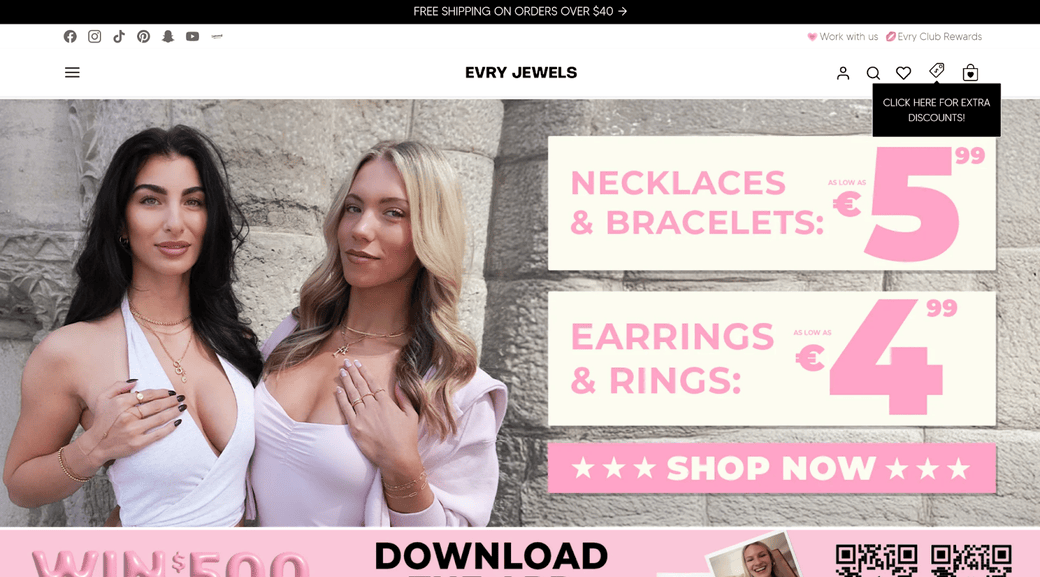Is Honey a Scam?
Laura Martisiute
Reading time: 6 minutes
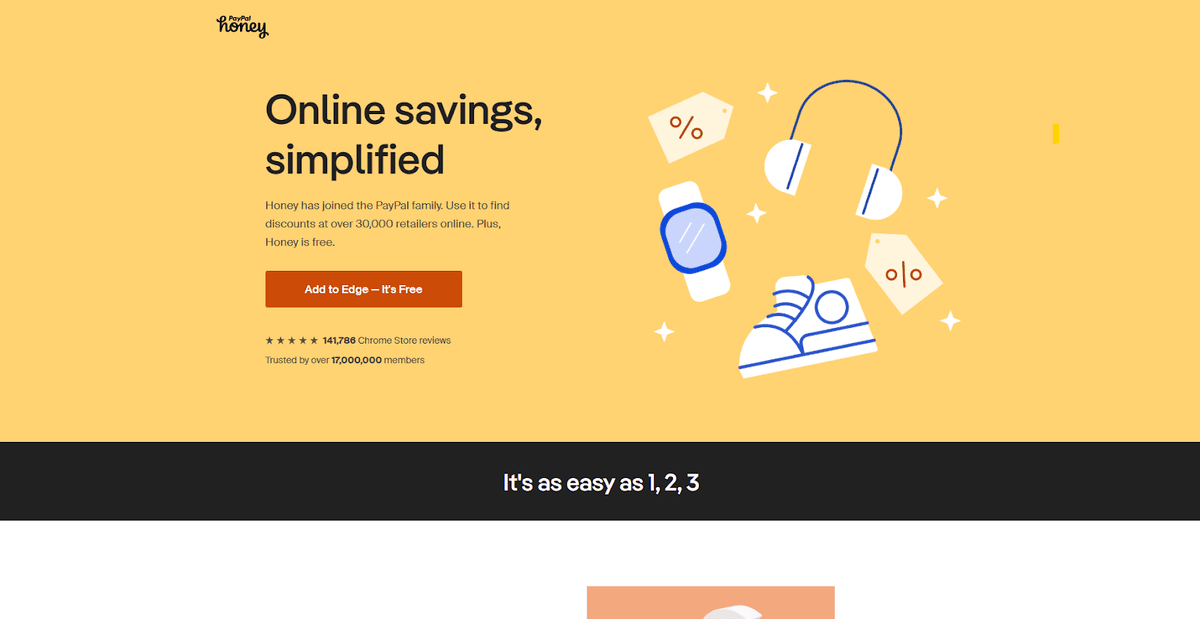
Table of Contents
If you’re thinking of using Honey, you need to know: Is Honey a scam?
Below, we explain whether Honey is a scam and discuss some steps you can take to improve your safety when using this browser extension.
What Is Honey?
Honey, also known as PayPal Honey, is a free browser extension designed to help you save money when shopping online. It is also available as a mobile app.
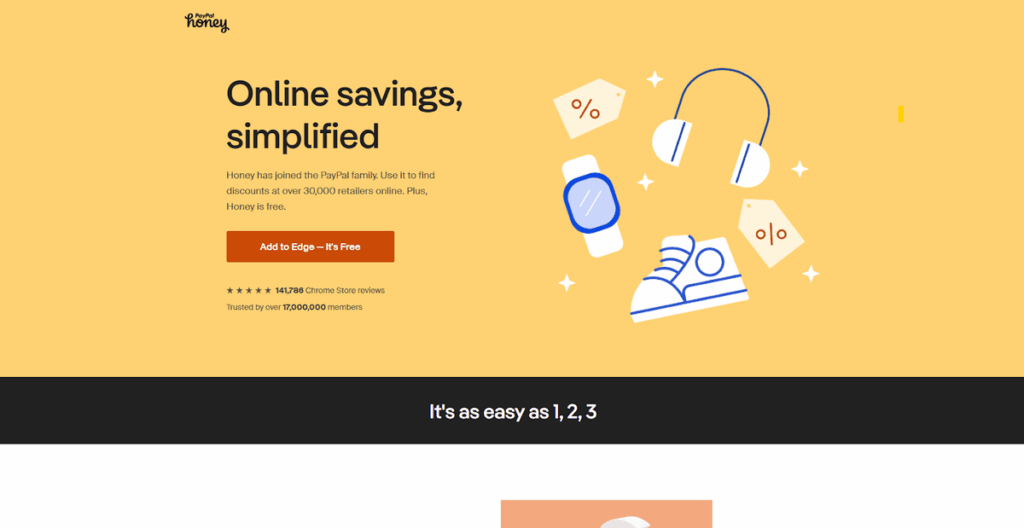
When you go to checkout at any online store, Honey automatically searches and tests all the coupon codes available, applying the best one that works.
Additionally, Honey can look for the best prices on Amazon.
It also lets you earn points when you shop on participating sites through PayPal Rewards, even if no coupon codes are available.
Is Honey a Scam?
Honey is not a scam, but it is also not the best coupon code tool out there.
In the past, third-party publications like dollarsprout and Well Kept Wallet have reviewed Honey positively.
However, Honey gets mainly negative user reviews:
- 2.1 out of 5.0 stars (from 5,168 reviews) on Trustpilot.
- 1.4 out of 5.0 stars (from 10,266 reviews and 5+ million downloads) on Google Play.
- 3.7 out of 5.0 stars (from 9,863 reviews) on the App Store.
- 1.6 out of 5.0 stars (from 45 reviews) on Trustindex.io.
- 1.6 out of 5.0 stars (from 40 reviews) on Sitejabber.
Honey has also been accused of unethical practices.
In late 2024, YouTuber MegaLag published a video accusing Honey of “hijacking” affiliate links, i.e., replacing the tracking information of influencers and content creators with its own during the checkout process. This allegedly takes commissions away from creators who originally referred the product/service, instead crediting Honey.
As a result, several influential YouTubers and content creators filed class action lawsuits against PayPal Honey. There’s a website where other creators can join the lawsuit, too.
Honey has also been accused of letting partnered retailers control which codes are shown to users, meaning that Honey may intentionally withhold better deals if those deals are not approved by retailer partners, potentially reducing savings.
Some users say they’ve noticed Honey failing to fetch the best coupon code possible, even though it was easily retrievable from the merchant’s site.

PayPal and Honey deny these allegations. The company issued the following statement:
“We dispute the allegations in the lawsuits, and will defend against them vigorously. Honey is free to use and provides millions of shoppers with additional savings on their purchases whenever possible. Honey helps merchants reduce cart abandonment and comparison shopping while increasing sales conversion. Honey follows industry rules and practices, including last-click attribution, which is widely used across major brands.”
Security
In its privacy policy, Honey outlines some of the security measures it has in place to keep your information safe.
These measures include the following:
- Defined roles and responsibilities for handling user information.
- Regular employee privacy and security training.
- Responding to privacy inquiries and complaints.
- Potential incident investigation.
- Limiting access to personal information.
- Encryption.
- Vulnerability testing.
- Advanced malware detection.
- Pseudonymization and anonymization techniques.
- And more.
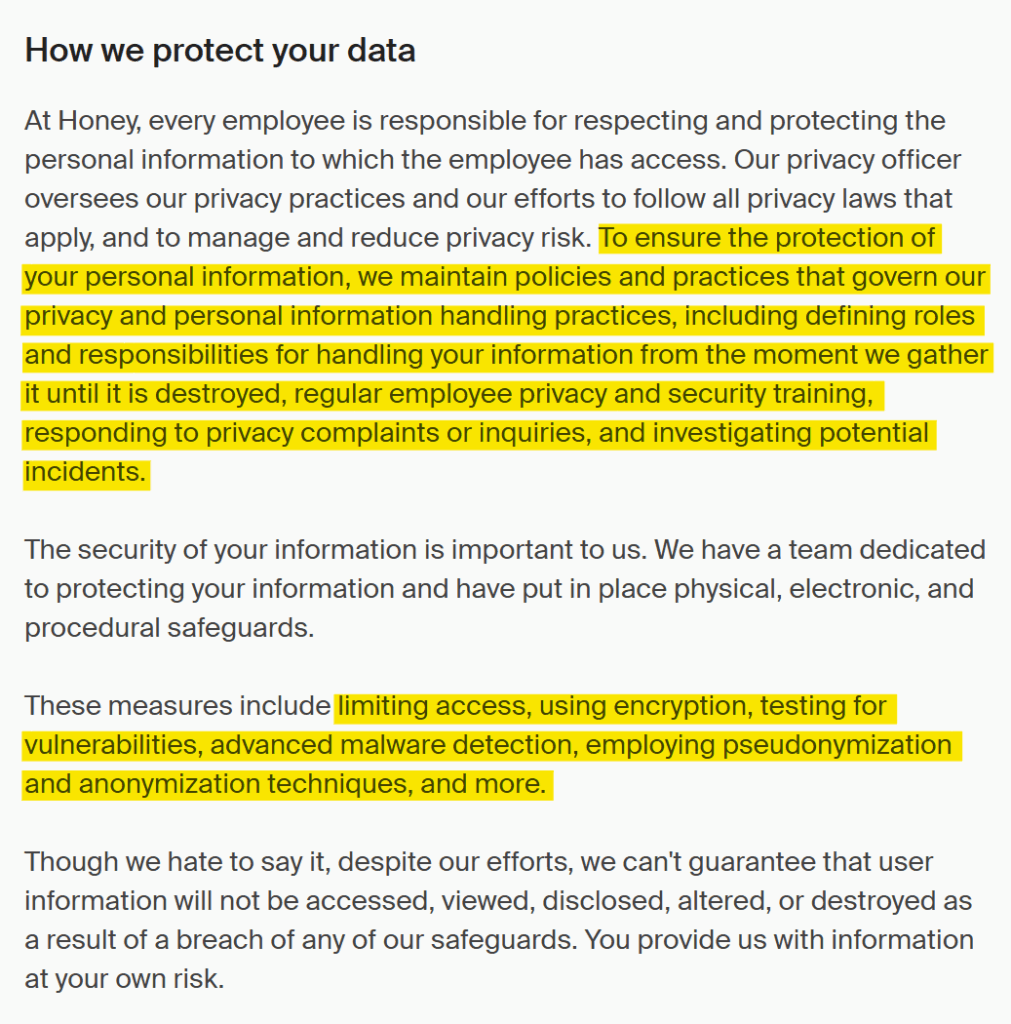
On its Google Play page, Honey says its app doesn’t collect your data or share it with third parties.
It also says it encrypts data in transit and allows users to request that their data be deleted.
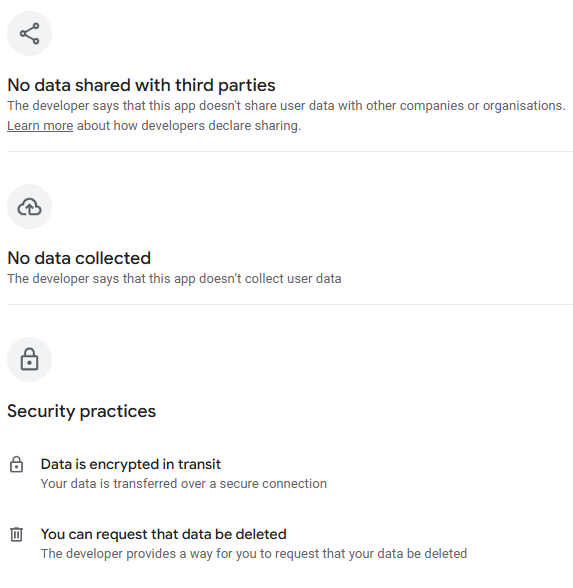
Privacy
Honey explains the kind of data it collects, why, and with whom it shares it in its privacy policy.
It collects the following information:
- Personal identifiers, e.g., name, email, IP address, device ID, PayPal profile info, login credentials, and billing address.
- Payment information.
- Commercial information, i.e., purchase and transaction data on retail sites.
- Internet/network activity, e.g., device type, browser, operating system, page views, event logs, interaction with Services.
- Shopping and usage data, e.g., retailer names, saved items, used coupons, followed stores, referrals.
- Inference data, i.e., behavioral insights and preferences inferred from usage.
- Sensitive data.
- Aggregate/anonymized data.
Honey uses this data to deliver and improve its services, personalize shopping experiences, manage fraud, for marketing and communication, comply with laws, respond to legal obligations, and for internal analytics and reward program administration.
It says it does not sell your personal information to third parties for money or share it for cross-context behavioral advertising.

It may disclose your information to its service providers, parent company PayPal, authorities (if legally required), and buyers or successors in mergers or acquisitions.
Your data is stored for the duration of your relationship with Honey plus 10 years (or longer if legally required).
PayPal’s retention policies may apply where relevant.
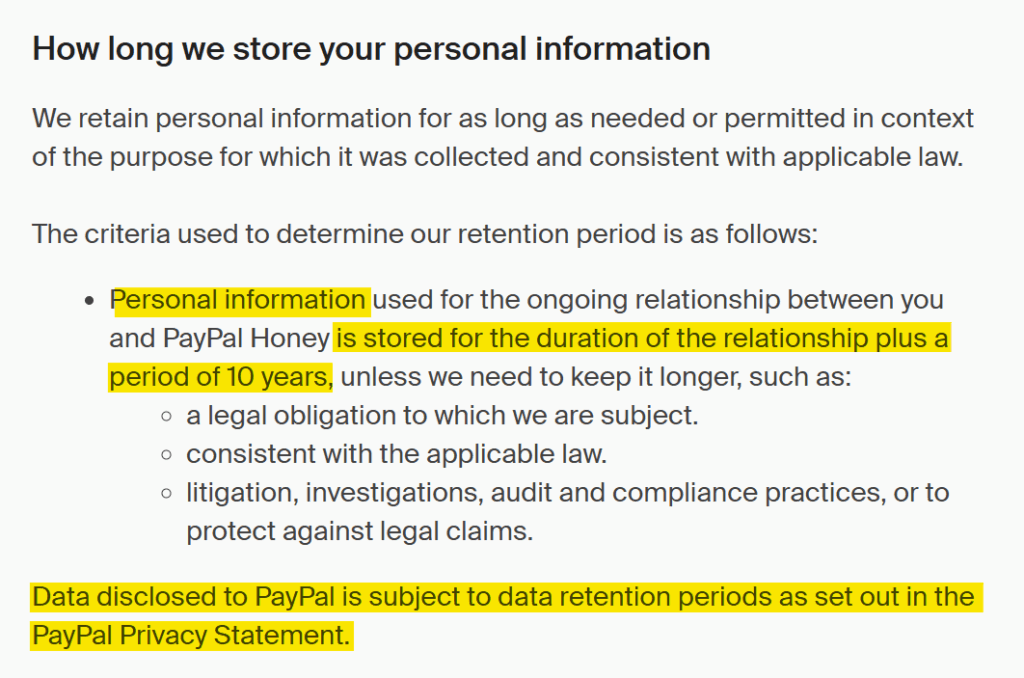
Terms of Service; Didn’t Read (ToS;DR), a project that rates internet services’ terms of service and privacy policies, hasn’t graded Honey yet. However, it has flagged some potential issues, including the fact that the service uses tracking technologies (e.g., tracking pixels, web beacons) and tracks you on other websites.
On the plus side, it says that Honey uses your data for limited purposes and does not sell your data.
On the other hand, ToS;DR gives PayPal, Honey’s parent company, a “Grade E.” This means “The terms of service raise very serious concerns.”
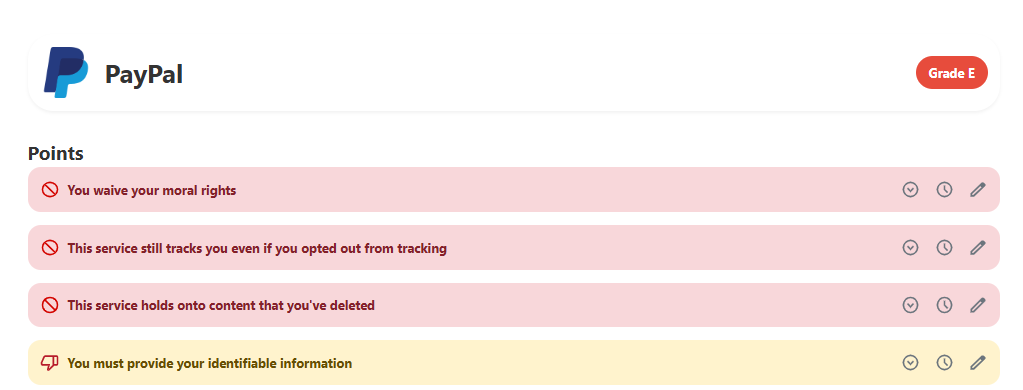
So, Should You Use Honey?
Honey can be a potentially good option for finding coupon codes and saving money. However, some users claim that it may withhold some of the best codes.
The recent controversy regarding affiliate link practices is also concerning.
In addition, the browser extension and app may not be the best from a privacy perspective, though Honey says it won’t sell your data to third parties or share it for cross-context behavioral advertising.
An alternative to Honey is searching for coupons manually or using reputable coupon websites or browser extensions.
How to Use Honey Safely and Privately
- Limit permissions. Review the permissions Honey asks for when you download the app and turn off any that are unnecessary.
- Don’t log in with social media. This reduces data sharing between platforms.
- Turn off Honey when not shopping. This helps ensure the tool doesn’t collect data unnecessarily.
- Clear or limit cookies. Or use browser settings or tools that do the same.
- Don’t save payment information. Enter payment details manually every time to minimize your exposure in case of a data breach.
- Use a separate or masked email. This helps keep your primary inbox more private and clean of spam.
Our privacy advisors:
- Continuously find and remove your sensitive data online
- Stop companies from selling your data – all year long
- Have removed 35M+ records
of personal data from the web
Save 10% on any individual and
family privacy plan
with code: BLOG10
news?
Don’t have the time?
DeleteMe is our premium privacy service that removes you from more than 750 data brokers like Whitepages, Spokeo, BeenVerified, plus many more.
Save 10% on DeleteMe when you use the code BLOG10.



